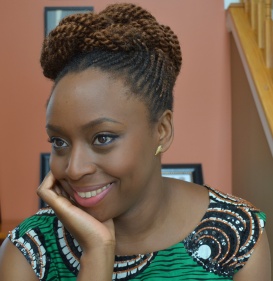To kick off our 2 Weeks of Chimamanda, which will culminate in the release of the Nigerian edition of Americanah, find below an excerpt from a recent interview.
Chimamanda Ngozi Adichie, the author of the bestselling Half of a Yellow Sun, speaks to Kate Kellaway about her new novel, Americanah, her Nigerian childhood and why she’s a hair ‘fundamentalist’
 In your third novel, Americanah, one of the characters warns about the inanity of asking what a book is about – “as if it were only about one thing”. But… I have to ask: what is Americanah about?
In your third novel, Americanah, one of the characters warns about the inanity of asking what a book is about – “as if it were only about one thing”. But… I have to ask: what is Americanah about?
It is about love. I wanted to write an unapologetically old-fashioned love story. But it is also about race and how we reinvent ourselves. It is about how, when we leave home, we become another version of ourselves. And it is also about hair…
We’ll come back to the subject of hair, but can you say where home is for you?
I live half the year in Nigeria, the other half in the US. But home is Nigeria – it always will be. I consider myself a Nigerian who is comfortable in the world. I look at it through Nigerian eyes.
How important is it to belong?
Belonging matters. I left home, at 19, to study in Philadelphia. I didn’t think about identity at all until I went to the US. There is a wonderful quotation from Peter Ackroyd about the relationship between longing and belonging. Much of my work is about this. I am given to unnecessary nostalgia, the longing for what isn’t there.
Do you miss the US when you are in Nigeria?
Yes, the very fast internet service. And regular electricity, not having to think about generators. I like the US and feel gratitude towards it.
You write brilliantly about love. What do you think makes a love last?
I wish I knew… if I did, I would market it. Lasting love has to be built on mutual regard and respect. It is about seeing the other person. I am very interested in relationships and, when I watch couples, sometimes I can sense a blindness has set in. They have stopped seeing each other. It is not easy to see another person.
Have you experienced love at first sight?
No, but I would like to.
You write with satirical precision about the way black people are patronised in the US and the UK – often in a well-meaning way. How widespread is this condescension? One of your characters – Kimberley – describes all black people as “beautiful”.
It is very widespread. There is a deep discomfort about the subject. People struggle to be honest and ordinary. I wish race didn’t matter. I wish that Kimberley – who is a character I love and not a racist – didn’t think all black people beautiful. It is worse in the US because of its racial history. People dismiss race and say, “We are all the same” – this is not true. I experience the world differently because I am female and because I am dark-skinned.
Your novel includes detailed descriptions of black women having their hair done. Please give me an honest description of your own hair and what it says about you?
That is the best question! My hair is in tiny cornrows; I have a big ponytail on the top of my head. I quite like it. It is natural. I am a bit of a fundamentalist when it comes to black women’s hair. Hair is hair – yet also about larger questions: self-acceptance, insecurity and what the world tells you is beautiful. For many black women, the idea of wearing their hair naturally is unbearable.
Tell me about your childhood…
I grew up in the university town of Nsukka in a big, close, laughing family. I was the first daughter, the fifth of six children. After the first three, my parents became more liberal and easy. My childhood was happy and effortless. My family is still close-knit. My father is a retired maths professor. My mother made history by being the first woman registrar at the university. None of my siblings is creative – they are sensible science people.
Read the rest of the interview here: http://www.guardian.co.uk/theobserver/2013/apr/07/chimamanda-ngozi-adichie-americanah-interview
